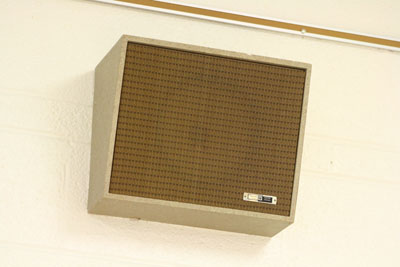As Madison Doyle makes her way to class, she notices the deserted vending machines and a reduced number of kids chattering outside classroom doors. Curious about the hushed hallways, she realizes there is only one explanation for the tranquility: the banishment of the bells.
“It makes us more calm and alert of time, and we are not as rushed as we used to be,” Doyle, sophomore, said. “Besides, the bells are loud, and they hurt your ears.”
The intercom system that controls the bells and speakers malfunctioned Sept. 15. According to Mike Wade, sophomore class principal, the glitch was immediately addressed because students and staff rely on the system for announcements and alerts such as fire drills. However, the company hired to fix the flaw lacked the necessary tools to do so, rendering the system inoperable for four days.
“This is when the change happened,” Wade said. “The first thing we noticed was the calmness in the hallways. Instead of a buzzer and everyone sprinting out of class at the same time, teachers could dismiss their kids when they were done talking.”
Inspired by the sudden serenity of the school, the administration switched the bells off after the intercom system was fixed.
“I love the pace of the halls, I love how kids are going to class instead of waiting in front of the vending machines for the warning bell and I love how instead of a harried rush, we’re seeing kids walking instead of talking,” Wade said.
The amount of tardies issued by teachers was also cut in half since the bells were officially silenced, according to Dr. Michael Havener, principal.
“Students are responding like young adults,” Havener said. “They are taking responsibility and getting to class on time.”
BJ Kenyon, history teacher, believes there is another explanation for the plummeting tardies.
“The bell is a signal that the class period has begun,” Kenyon said. “When a kid comes in late, and I know they’re late because my watch says so, but they claim they aren’t, it becomes an issue. Tardies have been cut because teachers don’t have that clear signal to issue tardies with.”
Despite the relaxed climate of the halls and the apparent drop in tardies, some teachers are reluctant to praise the idea of a KHS without bells.
“Class ends more efficiently, but it doesn’t begin as efficiently,” Kathleen Frese, math teacher, said. “If people are dismissed at different times, people will arrive to class at different times.”
Students such as Tyrice Harris, junior, do not completely agree with the decision to discontinue the use of the bells either.
“Students don’t know what time to get in class, and they can be late any time without teachers knowing,” Harris said. “Not having bells makes things more challenging instead of making kids feel more free.”
To gather and organize the clashing opinions of students and staff, each department chair will poll their departments and according to Wade, student leadership groups will be polled as well. The results will help determine whether or not KHS will remain bell-free.
“The clear message is we want to treat the kids like young adults,” Havener said. “We want to provide this responsibility as long as they don’t abuse it.”









